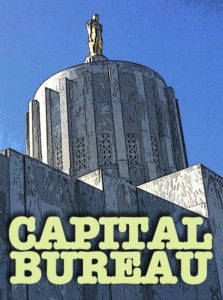By DICK HUGHES/Oregon Capital Bureau
SALEM — The Legislature’s coronavirus response committee is working through proposals to help Oregon businesses and residents handle the economic and health effects of the pandemic.
“What are the five most important things we must do as a Legislature to respond to this coronavirus?” committee co-chair Rep. Paul Holvey, D-Eugene, asked at Monday’s lengthy meeting. He said the committee’s immediate goal is to propose policies and funding that help individuals and small businesses survive.

He called the COVID-19 pandemic “the most serious issue I have known of in my lifetime hitting the state of Oregon,” and implored Oregonians to follow the health guidelines that have been put in place.
“Our biggest economic impact that we can have, right now in my opinion, is staying at home and stopping the spread of this virus. It’s so ultimately important. Please take it seriously,” Holvey said.
The committee will resume its work Tuesday with the goal of prioritizing its recommendations.
Co-chair Sen. Arnie Roblan, D-Coos Bay, said it will be up to Gov. Kate Brown and the Legislature’s Democratic and Republican leaders to create the plan for a special legislative session.
“The reality of the situation is, we were put in place to have real conversations for the public and everybody else to vet as many ideas as we thought were reasonable. We were also asked to prioritize those,” Roblan said of the Joint Special Committee on Coronavirus Response. “At the end of the day, the leaders of our four caucuses and the governor are going to have to come together to come up with a plan to have a special session, if we’re going to do that.

“Not all of our recommendations and ideas will probably be accepted. That’s the way the things are.”
The aim is to have a solid plan so a special session can be concluded in about one day, Roblan said.
Sen. Tim Knopp, R-Bend, said the number of special legislative sessions needed this year to deal with coronavirus could eclipse the five special sessions called to handle the recession of 2002, which lasted from four to 19 days each.
Helping the homeless was a top priority for committee members on Monday. They also discussed a slew of other issues, including unemployment benefits and potential delay of the new corporate activity tax.
Sen. Elizabeth Steiner Hayward, D-Portland, asked about economic assistance for independent contractors, such as hairdressers, who are not eligible for unemployment. It is unclear whether such businesses will be eligible for federal assistance.
“They are the smallest of the small business owners,” Holvey said. “That’s something we’ve got to figure out.”
Some businesspeople and legislators have proposed that agencies “pause all non-essential rulemaking and workgroups not related to the COVID-19 response.” Holvey said the governor may need changes in state law to have that flexibility.
He said most actions taken in the special legislative session would be temporary measures, not permanent state policy.
Rep. Duane Stark, R-Grants Pass, said regulations on workers’ maximum hours and on predictive scheduling are among those that should be relaxed to help employers deal with absences and other coronavirus-related issues.
Underscoring the uncertainty facing Oregonians, Sen. Denyc Boles, R-Salem, said, “I want to make sure we take care of our employers and our employees.”



